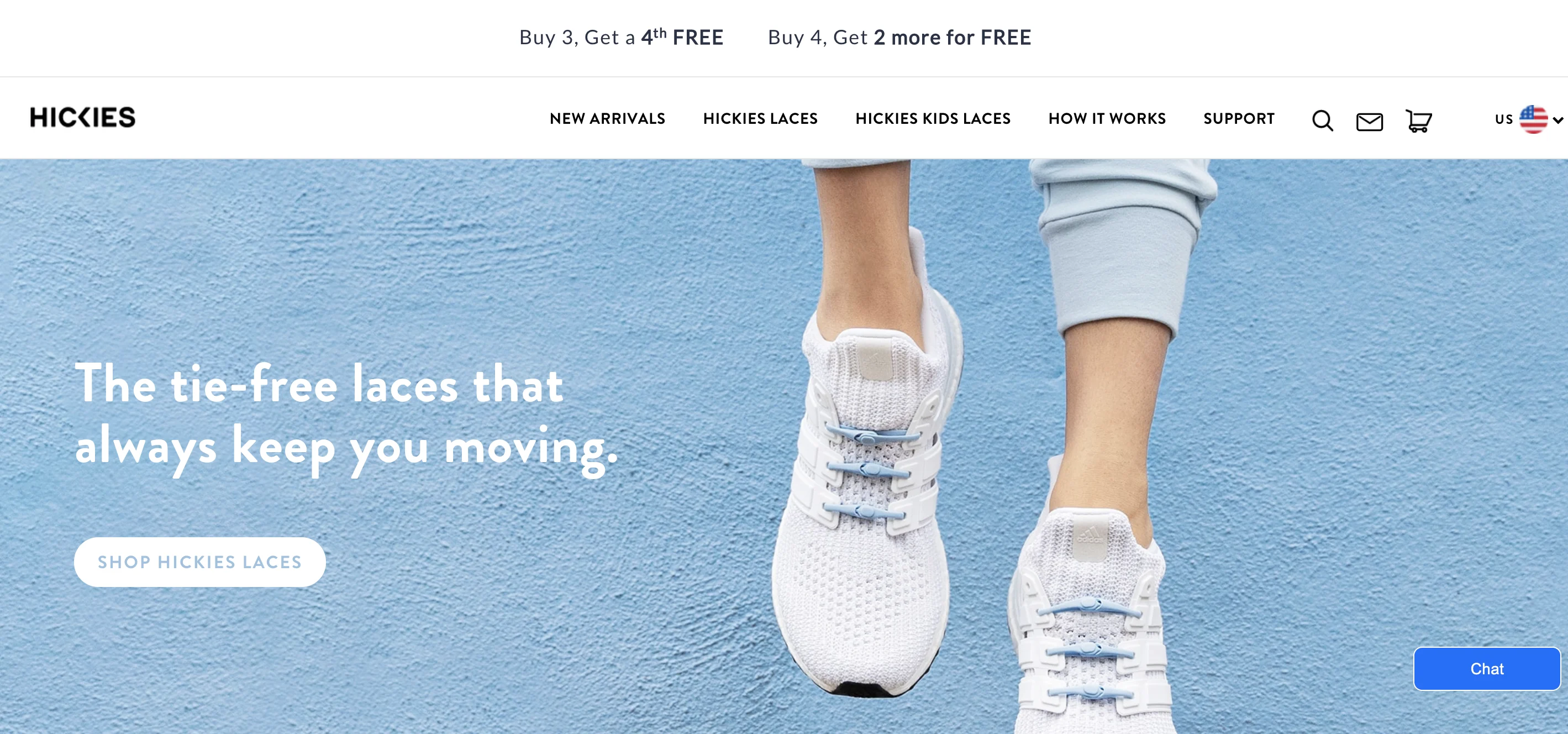6 Best Shopify Alternatives for Your Online Store

Shopify has almost become synonymous with ecommerce. For good reason. It’s one of the most popular ecommerce platforms on the market, powering over one million businesses in more than 175 countries.
However, just because something is popular, that doesn’t mean it’s always the best solution for you. As you’re probably well aware since you’re searching for alternatives to Shopify.
Whether you’re a current Shopify customer looking for other options or just starting to research what ecommerce platforms are out there, we can help.
We’ll review the best Shopify alternatives, including the pros and cons of each ecommerce solution, and learn why some business owners have migrated away from Shopify to BigCommerce.
What is Shopify?
Shopify is ecommerce software that allows you to operate an online store. Through the platform, you can build your website, manage products, calculate shipping rates, sell across multiple channels and more.
Additionally, since Shopify is a cloud-based, hosted solution (also called a SaaS or software-as-a-service), you’re not responsible for maintaining the software.
Shopify also serves both small businesses and larger enterprises with its Shopify and Shopify Plus ecommerce plans.
Shopify: This is for small businesses. With three pricing tiers — Basic, Shopify and Advanced — you get access to different features, depending on the plan you choose.
Shopify Plus: This is for enterprise businesses. Based on custom pricing (a percentage of revenue with a minimum of $2,000 per month), Shopify Plus customers get access to more advanced features, designed for higher volume stores.
Additionally, while there is no free plan, Shopify does offer Shopify Lite as an option if you want to include a buy button on your existing website or blog.
4 Reasons Why You’re Probably Looking for a Shopify Alternative
Now that we’ve got the basics out of the way, let’s review why you might be interested in a different platform to run your ecommerce business.
1. Don’t want to use Shopify Payments.
One reason is the ability to choose your payment gateway without any additional fees. With Shopify, if you don’t use their proprietary payment gateway, Shopify Payments (which is powered by Stripe), you can be charged transaction fees of up to 2% of each sale.
Plus, by not using Shopify Payments you are giving up access to some features, such as the ability to transact in multiple currencies. Additionally, if you sell a higher risk product, such as vaporizers, even if you want to use Shopify Payments, you can’t.
2. Want more control over site SEO.
Search engine optimization (SEO) is a big part of the marketing features offered with an ecommerce solution. And while Shopify does a good job of handling basic SEO tasks, you might want more control over your website — especially if you rely heavily on organic search.
For example, Shopify doesn’t allow users to access and edit robot.txt files. For those unfamiliar, this is the file you use to tell Google how to index your site so that only the webpages you want show up in the search engine results.
While in the beginning this may not be a problem for you, eventually as your site grows, you’ll probably want more say in how Google crawls and indexes your website.
3. Have a large complex catalog.
Let’s say you have a clothing store and you’re making an effort to be very inclusive. So you offer:
A range of sizes, from extra small all the way up to 6XL
Multiple color options for every item
Various designs, such as tank tops and long sleeves
Options for men, women, children and babies
Your product catalog is quickly going to get very complex — and Shopify might not be able to keep up since you’re capped at 100 SKUs per product and only three options per product.
4. You’re frustrated in some form or fashion.
Maybe there’s something else you’re frustrated with that’s prompting you to research other ecommerce platforms. Perhaps you just don’t like the design of the Shopify Help Center, you’re frustrated with customer support, or maybe you’ve heard about someone else’s bad experience and you’re worried the same thing could happen to you. Whatever the reason, you’ve got other options available to you.
Features You Should Consider on Your Next Ecommerce Platform
No matter what obstacles you’re facing with Shopify, you should make sure your next platform solves those problems without creating new ones. And while every online business is different, here are some features that you might want to take into consideration.
1. Multiple payment options.
Every customer has their preferred way to pay. One person might want to use their Visa so that they can rack up points while another person may want to use PayPal because they can make a purchase without the need to manually enter in their card number.
So when you’re evaluating new platforms, make sure they have a wide variety of payment processing providers to choose from. For example, BigCommerce supports over 55 payment gateways. Plus, once you start getting bigger, you can typically get better rates, which will reduce your costs.
Even if you aren’t selling cross-border now, don’t box yourself out of international expansion later. Consider platforms that offer payment gateways that can transact and settle in multiple currencies.
2. Customization opportunities.
Your business is totally unique to you, and you want to convey that to your customers. Plus, how you manage your business is probably different than how someone else manages theirs. That’s why customization is so important for web design.
When selecting your ecommerce solution, make sure you can easily make changes that work for your business model and your specific customers. If you’re a coder itching to create unique functionality, make that your priority.
On the other hand, if you’re not an expert website designer, take into account ease of use. So exactly how much time and effort it will take for you to make changes?
For instance, if you’re building an about us page, how do you add elements that aren’t text? Can you easily re-arrange pictures and videos?
If you don’t want to spend all of your time building your website, a drag-and-drop website builder, can give you all the functionality you need to make these changes — without the additional coding requirements.
3. A catalog that can grow as you grow.
We’ve already mentioned an example where you might have a large catalog, but what if your catalog is very small? Then, Shopify might work great for you. However, don’t let where you are now dictate where you’ll be in the future.
As a business owner, you need to anticipate growth. Think about the different types of technology you’ll need to implement. And then ask yourself if your ecommerce platform can work with those technologies.
6 Great Shopify Alternatives
Once you have a better idea of the features you do want for your next ecommerce platform, it’s time to evaluate Shopify competitors.
While we didn’t include every single ecommerce solution on the market, such as Volusion, Weebly or OpenCart, this list should give you a good idea of some of the most popular ecommerce platforms on the market today.
1. BigCommerce.
Founded in 2009, BigCommerce is a flexible, open SaaS ecommerce platform that enables businesses of all sizes to build and scale their online stores.
While Shopify is great for getting started, if you’re looking to grow and scale your business BigCommerce is the better choice.
Pros
Robust out-of-the-box features included with every plan.
Support for over 55 payment gateways with no additional transaction fees.
Page Builder, the drag-and-drop visual editor, doesn’t require any coding knowledge.
Omni-channel selling abilities, including an in-app checkout for social media platform Instagram.
Extensive SEO capabilities, such as fully customizable URLs.
Support available 24/7 with over 85% of issues resolved on the first phone call.
A large ecosystem of Agency and Technology Partners.
Cons
While BigCommerce has a wide range of paid themes, there are only five free themes, compared to the nine that Shopify offers.
Compared to Shopify, there’s a slight learning curve because you get so many more out-of-the-box features.
2. WooCommerce.
Launched in 2011, WooCommerce is an open-source plugin designed to transform WordPress websites and blogs into ecommerce websites.This makes WooCommerce a good alternative to Shopify if you’re already familiar with WordPress.
However, if you’re worried you can only use WooCommerce with your WordPress blog, don’t be. For instance, BigCommerce has an easy-to-use extension that will integrate with your existing WordPress site.
Pros
The plugin itself is completely free to use with any WordPress site.
It’s easy to integrate with any existing WordPress site.
Because it’s open source, you can fully customize your store’s code.
You have access to hundreds of free and paid extensions.
Cons
Even though the plugin is free, you’re still responsible for the costs of domain hosting, a SSL certificate, finding an email provider and other features.
To make the most of your ecommerce store, you’ll probably need the help of a dedicated developer or designer if you don’t know HTML or CSS.
Adding core features to WooCommerce requires plug-ins—leading to more complexity and lower site performance.
3. Magento.
First released in 2007, Magento is an ecommerce platform built on open source technology. Acquired by Adobe in 2018, Magento offers Magento Commerce for enterprise and Magento Open Source for small businesses.
So if you’re a big fan of Adobe’s other products and have extensive developer skills, you might prefer Magento to Shopify.
Pros
Because it’s open source, you have access to the backend to customize everything in your store.
Magento has a large network of over 260,000 developers worldwide creating additional functionality for the platform.
Enterprise businesses on Magento Commerce have the option of a cloud-hosted solution as part of the package hosted on AWS or a self-hosted solution.
You get access to a large partner ecosystem for third-party apps and add-ons.
Cons
Magento Open Source is strictly on-premise, so you either need to host it yourself or go through a third-party web hosting provider.
While Magento provides patches and upgrades, you are responsible for installing and managing these updates.
No matter which version you choose or how you host your website, you’ll need a developer, in-house IT team and/or an agency to manage the build and maintenance.
Magento has an extremely extensive setup, which leads to high costs to complete the builds.
4. PinnacleCart
Started in 2003, PinnacleCart is a shopping cart solution designed for small to mid-sized businesses with a strong focus on marketing.
As a Shopify alternative, it’s a great choice if you’re looking for more control over your storefront, as well as additional SEO features.
Pros
You can either choose hosting on PinnacleCart or you can choose to manage hosting on your own.
SEO-friendly features, such as schema.org tags and custom URLs.
Unlimited products and categories on every plan.
Cons
If you choose to host with PinnacleCart, there are caps on bandwidth and storage for their lowest $79.95 plan, so as you get more traffic you are going to pay extra or have to upgrade to a more expensive plan that offers unlimited bandwidth.
Because PinnacleCart has versions, you’ll need to manage upgrades.
There’s a very limited partner network, as it only integrates with 64 apps.
Unlike Shopify’s wide selection of themes, PinnacleCart only has 12 themes available.
5. Shift4Shop.
Since 1997, Shift4Shop has offered ecommerce software with a focus on SEO.
So if you’re an SEO junkie and you rely heavily on organic search, you might prefer Shift4Shop to Shopify.
Pros
Wide variety of SEO tools, like Google AMP for products and 301 redirects.
Built-in blogging platform included with every plan.
For very small stores, you can get a full ecommerce platform for less than the Basic plan on Shopify.
Over 100 online payment solutions, including international processors.
Cons
Limited number of staff users, costing an additional $10 a month per user.
There’s a steep learning curve, making it sometimes difficult to navigate the store builder and find the tools you need.
The free themes all have a very similar design that’s not as modern as the themes offered by Shopify or BigCommerce.
6. Wix.
Founded in 2006, Wix makes it easy for anyone to build a website — and offers business plans ideal for ecommerce businesses.
If you have limited experience and want an extremely simple web builder, Wix could be a better option than Shopify.
Pros
A drag-and-drop website builder makes it easy to get your store up and running quickly.
You get support for 6 options per product and a total of 300 variants SKUs.
Wix has a robust, well-organized Help Center that’s easy to search.
Each of their premium plans for ecommerce sites offers a free domain for one year.
Cons
Unless you’re on an enterprise plan with custom storage space, you’re limited to a maximum of 50GB.
Wix doesn’t offer Apple Pay or Amazon Payments as payment providers.
There’s currently no support via chat, so you’ll need to call or submit a ticket.
Searching through the app store can be challenging since Wix offers so many different website options that aren’t focused on ecommerce.
Choose BigCommerce as Your Alternative
We know you have a lot of options to choose from, but since you’re reading the BigCommerce blog, maybe you’re interested in learning more about what sets us apart from the other platforms.
And since we’ve already covered the highlights, it might be nice to hear from our Agency Partners why they would choose BigCommerce.
“After working with BigCommerce and other ecommerce platforms for more than a decade, we often find the platform offers a comparably advantageous solution for SMB merchants. BigCommerce’s native (non-app or customization dependent) featureset is one of the most complete, supporting nearly all verticals, selling models, and target audiences. Paired with a highly competitive pricing model, lack of transaction fees or significant app billings, BigCommerce defines an exceptional value. If a merchant is serious about ecommerce, and serious about a platform that provides an existing road map for growth, BigCommerce is an easy choice.” — Jordan Brannon, President at Coalition Technologies
“When compared to the other major ecommerce platforms available for SMB, BigCommerce excels with having an open templating framework which enables us to create customer experiences which drive engagement and commerce. Creating easily shoppable, brand relevant experiences is what sets SMB owned ecommerce apart from the large online marketplaces. Additionally, we often see a reduction in TOC after migrating to BigCommerce based on lower required maintenance allowing our ongoing support efforts to focus on initiatives which have a direct effect on constantly improving the business. Combining those qualities with an easy to use platform and strong customer service, makes BigCommerce a leader for helping create success for businesses of all sizes.” — Keith Karlick, Principal at Mercutio
3 Examples of Shopify Merchants Who Have Migrated to BigCommerce
To dive in a little deeper, take a look at the following brands and hear in their words why they made the switch from Shopify to BigCommerce.
1. Ideal Drape Makers.

Unlike many of their competitors, Ideal Drape Makers saw the potential of ecommerce. After launching their online store on Shopify, the small business quickly realized they were missing vital features and functionality that come out-of-the-box with BigCommerce — specifically the ability to handle faceted search and a large catalog of 60,000 products.
After making the switch to BigCommerce, Ideal Drape Makers was able to create a truly great visitor experience that increased revenue by 41%.
“I like having a single platform where you have all of the features already built in that you need and a single support point of contact.” — Nancy Vamvakas, Owner of Ideal Drape Makers.
2. Veppo Vape Shop.

In a bid to improve customer experience, Veppo Vape Shop bought into the marketing hype of Shopify Plus and switched over to them from BigCommerce. However, at the time they switched, they experienced challenges modifying orders and accurately tracking inventory, which ultimately led to a decline in customer satisfaction.
Once Veppo Vape Shop moved back to BigCommerce, they were able to increase company efficiency and customer satisfaction thanks to the built-in features, such as bulk pricing, and heavy customizations to checkout that enabled a more seamless process for subscription orders.
“Throughout our trials and tribulations, we discovered that BigCommerce has the most integrated system available and designed for an exceptional customer experience.” — Sabina King, Co-Founder & CEO at Veppocig.com
3. Hickies.

After using Shopify for a few years, Hickies grew frustrated with the numerous limitations on continuing to expand internationally, including the fact that Shopify Payments didn’t operate in many of the countries in their system. Additionally, Hickie’s wanted to easily launch Google Pay to make the checkout processes faster for their customers.
Once they made the jump to BigCommerce, the company experienced an 804% increase in total online sales month over month.
“Adding Google Pay to our storefront was super quick and seamless — it was literally flipping on a switch… The fact that it was so easy to implement and required no additional work to get it working was huge for us.” — Jonathan Segev, Hickies Director of Technology
Conclusion
While Shopify might be right for some people, it doesn’t work for everyone. And that’s perfectly fine. There are a lot of ecommerce platforms out there that will help you build and grow your online business.
Make sure you consider the ecommerce features that will have the biggest impact, whether that’s offering multiple payment processors, limiting transaction fees, real-time inventory management, setting up dropshipping or a user-friendly interface. And then, take some time to evaluate and test each platform. For instance with BigCommerce, you can sign up for a 15-day free trial with no credit card required.
At the end of the day, we know we’re a great option for most businesses, but the most important thing to remember is that you have to choose what’s right for you.

Shelley Kilpatrick is an accomplished content marketer who creates compelling, original content designed to educate and empower ecommerce businesses. She is currently Senior Manager of Content Marketing at BigCommerce where she leads a world-class team of content writers and strategists. Outside of work, she loves exploring all things Texas BBQ and craft beer with her husband and two dogs.


